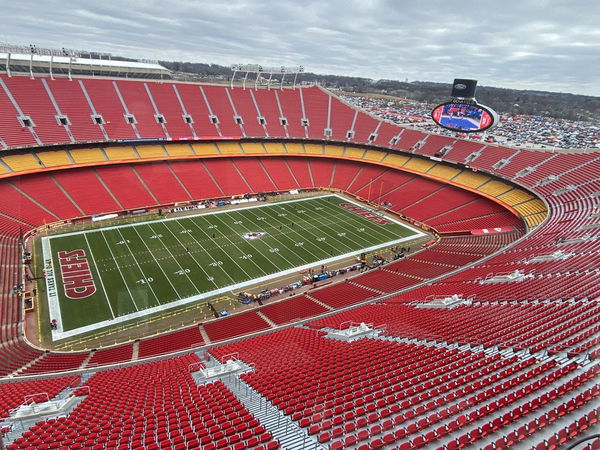

The Kansas City Chiefs are facing a fourth and long situation, but this time, it’s not on the field. It’s a high-stakes game between Missouri and Kansas for the team’s future home turf. The recent situation was sparked by a shocking April 2024 play when Jackson County voters sacked a sales tax extension for stadium upgrades.
Watch What’s Trending Now!
KC Mayor Quinton Lucas recently threw a Hail Mary, revealing a whopping $400 million-plus offer to keep one of the city’s pro teams. “I have been in meetings booked to put forward at least an offer of $400 million plus for one of our professional franchises to stay within the city,” Lucas stated last week, dropping jaws across both states. “We remain in the first quarter of the Kansas City stadium discussion,” he added.
Kansas will keep this offer on the table for a year. It’s only for National Football League or Major League Baseball teams in neighboring states. This move has Missouri lawmakers crying foul, accusing Kansas of unnecessary roughness in their 2019 economic truce. For years, Kansas and Missouri waged an economic development “border war.”
ADVERTISEMENT
They offered incentives to companies willing to hop the state line. This practice burned through taxpayer money but rarely created new jobs. Missouri House Majority Leader Jonathan Patterson didn’t mince words in an interview on Thursday: “It’s a wakeup call to Missouri that there are other states that are willing to do whatever it takes to get the teams.”
Kansas isn’t just playing defense in this border war. They’ve gone on the offensive. Last Friday, Kansas Gov. Laura Kelly signed legislation which will enable the state to lure the Super Bowl champions Kansas City Chiefs and Major League Baseball’s Kansas City Royals away from Missouri by helping the teams pay for new stadiums.
This financial blitz could provide up to 70% funding for stadium projects with a minimum $1 billion price tag and 30,000 seats, potentially sacking Missouri’s hopes of keeping their beloved Chiefs.
ADVERTISEMENT
The Chiefs had plans to renovate GEHA Field at Arrowhead Stadium this year, but Jackson County, Missouri, voters in April rejected the extension of a sales tax. This would have aided in financing a new downtown Kansas City baseball stadium for the Royals and upgrades to the Chiefs’ Arrowhead Stadium.
ADVERTISEMENT

Patterson called the border war talk “somewhat irrelevant.” “It’s obvious that Kansas is going to act,” he said, “and I think we should focus on acting ourselves and not crying about some sort of truce that may or may not have been agreed to regarding the teams.”
ADVERTISEMENT
But Missouri isn’t ready to throw in the towel just yet. An Emerson College Polling/The Hill survey reveals that 62.9% of Missourians want to keep Patrick Mahomes and company in the Show-Me State, with 46% deeming it “very important.” That’s some serious home-field advantage for Missouri in these high-stakes negotiations. Patterson said he expected to see Missouri put together a plan after this summer’s primary elections and before the Missouri General Assembly returns for its legislative session in January. But there is bad news for those in Missouri.
Chiefs as well as Royals are interested in exploring the Kansas option. After the bill cleared the legislature, Korb Maxwell, an attorney for the Chiefs who lives in Kansas said, “We’re excited about what happened here today. “This is incredibly real.” The lease on the Missouri complex with the teams’ side-by-side stadiums runs through January 2031, but both teams are interested in planning for the future.
With all this going on, what does the future hold for Patrick Mahomes and the Chiefs? Will Missouri be able to keep the popular franchise?
ADVERTISEMENT
Can Missouri secure Patrick Mahomes’ Chiefs’ legacy amidst Kansas’ billion-dollar bidding war?
Building new digs for the Chiefs and Royals isn’t just pocket change. We’re looking at a $2 billion price tag for the Chiefs and $1.5 billion for the Royals. That’s enough to make even the most die-hard fans fumble their wallets, especially with the Truman Sports Complex lease set to expire in 2031.
ADVERTISEMENT
Kansas isn’t just waving pom-poms from the sidelines. Their STAR Bond plan could cover up to 70% of stadium costs, with Governor Laura Kelly touting potential economic benefits. “Kansas now has the opportunity to become a professional sports powerhouse,” Kelly enthused, envisioning a future where the Chiefs and Royals join Sporting KC in boosting the Kansas economy.
However, some are throwing challenge flags on the economic impact. A 2022 empirical study suggests stadiums aren’t major drivers of economic growth, raising concerns about bond repayment if revenues fall short.
Top Stories
Sean Payton Announces Retirement Plans as Broncos HC Demands Improvement From Bo Nix & Co. Before Playoffs

Sean McDermott Announces Bad News for Bills After Massive Update on Josh Allen’s Injury

Former Packers QB Makes Decision on Shark Tank’s Offer for His $850K Business

Dez Bryant Unloads on Jerry Jones & Cowboys Over ‘Blackmailing,’ Defends Micah Parsons in Negotiations

Philip Rivers Announces Retirement Decision After Colts Benched 44-YO QB

Missouri’s playbook? Governor Mike Parson is in the war room, crafting a competitive bid. Losing both teams would be like getting sacked on fourth and long for the state’s pro sports scene, potentially reducing their major league teams from six to four.
ADVERTISEMENT

USA Today via Reuters
Mandatory Credit: Peter Aiken-USA TODAY Sports
Missouri Sen. Denny Hoskins, a Warrensburg Republican, said the border war “didn’t benefit anyone.” He called upon Missouri Department of Economic Development to make an offer. He further stated, “Missouri taxpayers shouldn’t be on the hook for financing stadiums for billion-dollar corporations and multimillion-dollar athletes,” he said. “It’s hard enough being a Missourian right now just trying to keep your own money in your pocket, let alone financing stadiums for a billion-dollar industry.”
Jackson County Executive Frank White Jr. is calling for a timeout on this “counterproductive stadium bidding war.” He’s urging both sides to honor their 2019 economic truce, stating, “Our resources should be used wisely to improve the lives of our residents, not wasted on bidding wars that only serve to drain public funds and divide our region.”
ADVERTISEMENT
As the clock ticks down, fans are left wondering: Will the Chiefs stay true to their Missouri roots, or will they make a break for the Kansas end zone? With both states eyeing sales tax, gambling revenue, and sports betting funds to finance these mega-projects, taxpayers might end up feeling like they’ve been tackled for a loss. The final score in this interstate showdown remains to be seen, but one thing’s for sure–it’s going to be a nail-biter right to the two-minute warning.
ADVERTISEMENT
ADVERTISEMENT
ADVERTISEMENT

